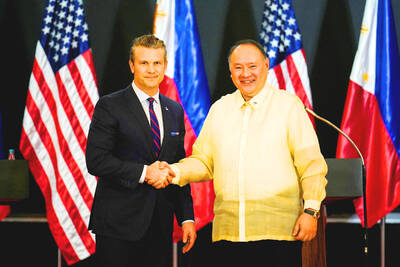International lawyers and anti-war campaigners reacted with astonishment on Wednesday after the influential Pentagon hawk Richard Perle conceded that the invasion of Iraq had been illegal.
In a startling break with the official White House and London lines, Perle told an audience in London: "I think in this case international law stood in the way of doing the right thing."
US President George W. Bush has consistently argued that the war was legal either because of existing UN Security Council resolutions on Iraq -- also the British government's publicly stated view -- or as an act of self-defense permitted by international law.
But Perle, a key member of the defense policy board which advises US Secretary of Defense Donald Rumsfeld, said that "international law ... would have required us to leave [former Iraqi president] Saddam Hussein alone," and this would have been morally unacceptable.
French intransigence, he added, meant there had been "no practical mechanism consistent with the rules of the UN for dealing with Saddam Hussein."
Perle, who was speaking at an event organized by the Institute of Contemporary Arts at the Old Vic theater in London, had argued loudly for the toppling of Saddam since the end of the 1991 Gulf war.
"They're just not interested in international law, are they?" said Linda Hugl, spokeswoman for the Campaign for Nuclear Disarmament, which launched a court challenge to the war's legality last year.
Perle's remarks bear little resemblance to official justifications for war, according to Rabinder Singh, the attorney who represented the UK's Campaign for Nuclear Disarmament (CND) and also participated in the event.
Certainly the British government, he said, "has never advanced the suggestion that it is entitled to act, or right to act, contrary to international law in relation to Iraq."
The Pentagon adviser's views, he added, underlined "a divergence of view between the British government and some senior voices in American public life [who] have expressed the view that, well, if it's the case that international law doesn't permit unilateral pre-emptive action without the authority of the UN, then the defect is in international law."
Perle's view is not the official one put forward by the White House.
Its main argument has been that the invasion was justified under the UN Charter, which guarantees the right of each state to self-defense, including pre-emptive self-defense.
UN Secretary General Kofi Annan has questioned that justification, arguing that the Security Council would have to rule on whether the US and its allies were under imminent threat.
Coalition officials countered that the Security Council had already approved the use of force in Resolution 1441, passed a year ago, warning of "serious consequences" if Iraq failed to give a complete accounting of its weapons programs.
"I think Perle's statement has the virtue of honesty," said Michael Dorf, a law professor at Columbia University who opposed the war, arguing that it was illegal.
"And, interestingly, I suspect a majority of the American public would have supported the invasion almost exactly to the same degree that they in fact did, had the administration said that all along," Dorf said.

‘EYE FOR AN EYE’: Two of the men were shot by a male relative of the victims, whose families turned down the opportunity to offer them amnesty, the Supreme Court said Four men were yesterday publicly executed in Afghanistan, the Supreme Court said, the highest number of executions to be carried out in one day since the Taliban’s return to power. The executions in three separate provinces brought to 10 the number of men publicly put to death since 2021, according to an Agence France-Presse tally. Public executions were common during the Taliban’s first rule from 1996 to 2001, with most of them carried out publicly in sports stadiums. Two men were shot around six or seven times by a male relative of the victims in front of spectators in Qala-i-Naw, the center

Incumbent Ecuadoran President Daniel Noboa on Sunday claimed a runaway victory in the nation’s presidential election, after voters endorsed the young leader’s “iron fist” approach to rampant cartel violence. With more than 90 percent of the votes counted, the National Election Council said Noboa had an unassailable 12-point lead over his leftist rival Luisa Gonzalez. Official results showed Noboa with 56 percent of the vote, against Gonzalez’s 44 percent — a far bigger winning margin than expected after a virtual tie in the first round. Speaking to jubilant supporters in his hometown of Olon, the 37-year-old president claimed a “historic victory.” “A huge hug

Two Belgian teenagers on Tuesday were charged with wildlife piracy after they were found with thousands of ants packed in test tubes in what Kenyan authorities said was part of a trend in trafficking smaller and lesser-known species. Lornoy David and Seppe Lodewijckx, two 19-year-olds who were arrested on April 5 with 5,000 ants at a guest house, appeared distraught during their appearance before a magistrate in Nairobi and were comforted in the courtroom by relatives. They told the magistrate that they were collecting the ants for fun and did not know that it was illegal. In a separate criminal case, Kenyan Dennis

The US will help bolster the Philippines’ arsenal and step up joint military exercises, Manila’s defense chief said, as tensions between Washington and China escalate. The longtime US ally is expecting a sustained US$500 million in annual defense funding from Washington through 2029 to boost its military capabilities and deter China’s “aggression” in the region, Philippine Secretary of Defense Gilberto Teodoro said in an interview in Manila on Thursday. “It is a no-brainer for anybody, because of the aggressive behavior of China,” Teodoro said on close military ties with the US under President Donald Trump. “The efforts for deterrence, for joint resilience